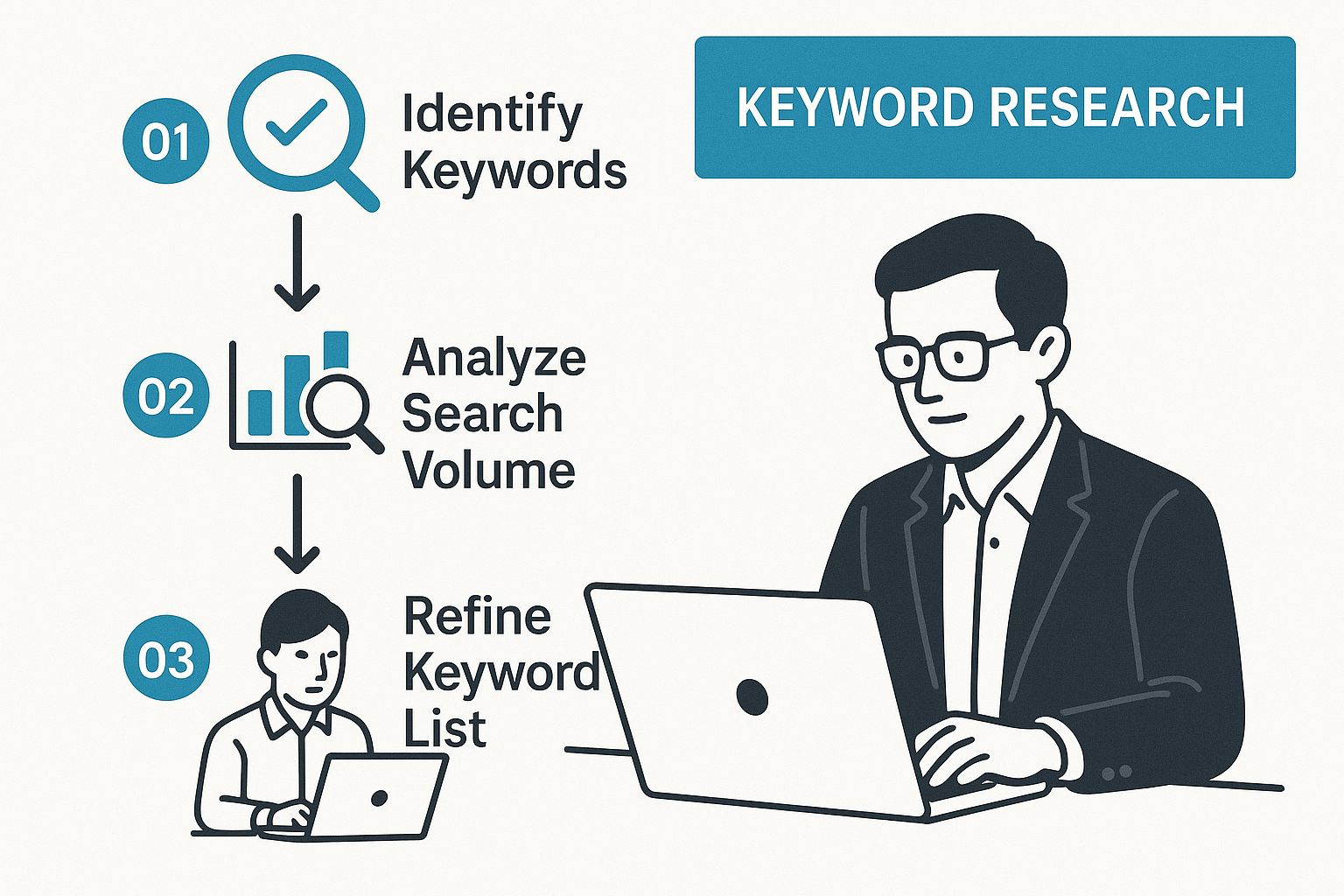Property management SEO is a different beast altogether. For large-scale operators, it’s not about getting any random person to your website; it's about optimizing your online presence to attract high-value property owners managing substantial portfolios. We’re talking about using the right keywords that reflect operational scale, nailing your technical SEO to signal professionalism, and building a local search presence that connects you with portfolio owners looking for serious, scalable management solutions.
Why Your Current SEO Strategy Is Failing to Attract Enterprise Clients
Feeling like you're just spinning your wheels with your property management SEO? You're definitely not alone. It's a common story: large-scale operators pour money into digital marketing only to see a trickle of qualified owner leads.
The problem usually boils down to a fundamental misunderstanding of the enterprise market. The goal isn't just to rank on Google. It's to connect with a very specific, high-value audience in a search environment that’s surprisingly... static. This disconnect is a huge challenge, leaving you fighting for visibility in a crowded space where traditional SEO tactics often attract the wrong crowd (tenants) or completely miss the serious portfolio owners you need to grow.
The Great Stagnation Paradox
Here’s a fact that might change how you see everything: Google search volume for the term “property management” has been pretty much flat for over a decade.
Think about that. The rental market is booming, yet peak search interest for that key term happened way back in July 2011 and hasn't been topped since. At the same time, an estimated 70% of rental properties are still self-managed, which is a massive untapped market of potential clients.
This paradox means you're competing fiercely for a slice of a pie that isn't getting any bigger. A generic SEO strategy targeting broad terms is a perfect recipe for attracting low-quality leads and getting lost in the noise.
Moving Beyond Generic Tactics
For large portfolios laser-focused on metrics like cost per door and DOM (days on market) reduction, a generic SEO approach just doesn't cut it. Your ideal clients aren't just typing "property management" into Google. They're searching for real solutions to complex operational headaches at scale.
They’re asking questions like:
- "How to scale property management operations for 1000+ units"
- "Software for managing multi-market rental portfolios"
- "ROI on professional property management fees for large portfolios"
- "Strategies to reduce vacancy rates across a scattered-site portfolio"
If your website and content don't directly tackle these high-intent, pain-point-driven questions, you’re basically invisible to the owners who can actually grow your business. An effective strategy means shifting from chasing vanity rankings to building an ROI-driven engine that speaks the language of operational efficiency and profitability. If your current efforts aren't moving the needle, it might be time to bring in a fresh set of eyes; for complex issues, hiring an SEO specialist to audit your entire approach can be a game-changer.
The modern SEO blueprint for large-scale property managers isn't about ranking #1 for "property management." It's about becoming the definitive online resource for owners seeking to optimize, scale, and increase the profitability of their rental portfolios.
This guide will give you a new framework. We're going to move past the outdated tactics and lay out a step-by-step plan to attract, engage, and convert the high-value property owners your portfolio needs to thrive.
Finding Keywords That Actually Attract Property Owners
Here’s the biggest mistake I see property management companies make with their SEO: they think like a renter, not a property owner. They blow their marketing budget chasing tenant-focused keywords like “apartments for rent in Denver,” which brings in a ton of traffic that will never turn into a management contract.
The real gold is in the specific, high-intent search terms that property owners use when they're trying to solve a real business problem at scale.
Think about it. An owner with a 500-unit portfolio isn't just typing "property management" into Google. They’re wrestling with complex issues around profitability, scaling, and operational efficiency. Your keyword strategy needs to meet them right there, in that moment of need.
This image really breaks down how you need to dig deeper to find those high-value terms.

It’s all about moving from those broad, general searches to specific, problem-focused queries that scream "I need to hire a scalable operator."
From Broad Searches to High-Intent Keywords
To get the right eyeballs on your site, you have to master long-tail keywords. These are the longer, more descriptive phrases that tell you exactly what a searcher is looking for. Sure, they have lower search volume individually, but the conversion intent is through the roof.
Here’s the difference in action:
- Broad Keyword: "property management software" (This could be anyone—a student, a DIY landlord, or a massive enterprise.)
- High-Intent Keyword: "enterprise property management software for multi-market portfolios" (This tells you it's a large-scale operator with very specific, high-value needs.)
Your job is to build a content library around the phrases that speak directly to your ideal client's pain points. Get inside their heads and think about the language they’d use with their own team.
The best keywords aren't just words; they're problems. When an owner searches for "how to reduce rental vacancy rates," they are actively looking for a solution. Your content needs to be that solution.
How to Uncover Market-Specific Opportunities
Of course, tools like Ahrefs and SEMrush are your best friends here. But don’t just plug in a few words and export a giant spreadsheet. Use these platforms for competitive intelligence. See what your direct competitors are ranking for, but more importantly, look for the gaps they’ve completely missed.
Here's a simple, actionable framework to guide your research:
- Map Out the Owner's Journey: Brainstorm keywords for every stage. Think about their initial research ("rental property ROI calculator for 100+ units") all the way to when they're ready to hire ("best property managers for scattered site portfolios").
- Zero in on Pain Points: Target queries that revolve around problems you solve, like DOM reduction, scaling operations, or cost per door optimization. Think "strategies to reduce days on market rental property" or "optimizing cost per door property management."
- Use 'Problem' Modifiers: Get specific by adding words like "how to," "software," "solutions," "costs," and "for large portfolios" to your main keywords. This is how you unearth the really juicy, actionable queries.
This table shows how to map different types of keywords to the property owner's mindset and the kind of content that will resonate with them.
Keyword Intent Mapping for Property Owners
Mapping keywords this way ensures you're creating content that meets owners exactly where they are in their decision-making process.
By sticking to this methodical approach, your content will align perfectly with the needs of serious property owners. Focusing on these high-intent phrases is how you generate more qualified property management leads and build a reliable pipeline of your ideal clients. Every article, every blog post, every landing page should serve one purpose: to directly answer a question your next big client is asking. That's the bedrock of an SEO strategy that actually drives growth.
Dialing in Your Website’s Technical SEO
Alright, you've figured out the keywords that attract property owners. Now what? The next move is making sure your website is a powerful, well-oiled machine that Google loves to crawl and rank. This is where technical SEO comes into play.
Think of it as all the crucial, behind-the-scenes work that makes your site fast, mobile-friendly, and dead simple for search engines to understand. It’s the non-negotiable foundation for any serious digital strategy.
Your website is your digital storefront. If it’s slow, broken, or confusing to navigate, potential clients will click away before you ever get a chance to show them the value you offer. For larger property management companies, a flawless technical setup isn't just nice to have—it signals professionalism and operational excellence to both Google and high-value portfolio owners.

Core On-Page Elements That Attract Owners
On-page SEO is all about optimizing individual pages to improve their search rankings and, just as importantly, the user experience. It’s about structuring your content in a way that clearly communicates your value proposition.
For attracting property owners, here’s what really matters:
Compelling Title Tags and Meta Descriptions: These are your first impression in the search results. A generic "Property Management Services" won't cut it. Instead, try a title like, "Scale Your Portfolio | Enterprise Property Management Solutions." The meta description should hit on their pain points directly: "Reduce DOM and optimize cost per door with our tech-forward management services. See how we help large portfolios increase profitability."
Logical Heading Structure (H1, H2, H3): Keep it clean. Use one H1 tag per page for your main topic, like "Multi-Market Property Management." Then, use H2s and H3s to break down subtopics such as "Standardizing Processes Across Regions" or "Remote Operations Technology." This makes your content scannable for busy executives and much easier for Google to index properly.
Optimized Images: Huge image files are one of the biggest culprits of slow-loading pages. Always compress your images before uploading them. And don't forget descriptive alt text. Something like
alt="dashboard showing portfolio performance metrics"gives search engines valuable context.
The Non-Negotiable Technical Fundamentals
Beyond the elements on each page, your site's overall technical health is critical. These factors are what tell search engines whether your site is a credible, authoritative source. If you need a deeper dive, check out this excellent guide to what technical SEO is.
Your technical SEO checklist absolutely must include:
- Blazing-Fast Site Speed: Every single second counts online. A slow site frustrates visitors and tanks your rankings. Use tools like Google's PageSpeed Insights to test your site and find what's slowing it down. You should be aiming for a load time under three seconds.
- Mobile-First Design: It’s a mobile world. The majority of potential clients will find you on their phone. Your website has to deliver a seamless experience on any device, period. A responsive design that adapts to every screen size is essential for capturing leads on the go.
- Structured Data (Schema Markup): This is a bit of code you add to your site that helps search engines make better sense of your content. Implementing
LocalBusinessschema, for example, can help you pop in local search by showing your address, phone number, and hours right in the results.
A technically flawless website does more than just rank well—it builds trust. When a portfolio owner lands on a fast, professional, and easy-to-navigate site, it reflects the efficiency and attention to detail you bring to managing their assets.
At the end of the day, all your SEO efforts are designed to funnel traffic back to your website. But if that site has a poor technical foundation, you'll cripple your ability to convert that hard-won traffic.
By dialing in these on-page and technical elements, you ensure your digital front door is always open and ready to turn high-value visitors into partners. A great website is a lead-generation machine, and understanding your property management website conversion rates is the first step to optimizing that machine.
Dominating Local Search in Every Market
If you're managing properties across multiple cities or states, your local SEO presence isn't just part of the strategy—it is the strategy. High-value property owners rarely look for a national firm. They search for the dominant local experts who know their specific market inside and out.
Winning at local search means showing up in the Google Map Pack every single time an owner in one of your target cities searches for management services.
This is where your Google Business Profile (GBP) becomes your most powerful tool. A fully built-out GBP for each location you serve is like a digital billboard. It tells Google and potential clients that you're a legitimate, authoritative player in that area. Just creating a listing isn't enough; you have to actively manage and fine-tune it to grab those high-intent searches.
Mastering Your Google Business Profile
Think of your GBP as the first handshake. It's often the very first interaction a property owner has with your brand. An incomplete or outdated profile is a huge red flag, screaming a lack of attention to detail—a quality no owner wants in their property manager.
To turn each profile into a lead-generating machine, you need to nail these core areas:
- Complete Every Single Section: It sounds obvious, but it’s the most common mistake I see. Fill out everything: services, hours, photos, and a detailed business description. Use the keywords owners actually search for, like "portfolio management," "cost per door optimization," and "remote management operations."
- Generate Owner-Specific Reviews: Social proof is everything. You need a system to request reviews from your satisfied owners, not your tenants. When you reply, drop in the city and the service you provided (e.g., "We're glad we could help optimize your multifamily portfolio in Austin!"). This is a subtle but powerful way to reinforce your local relevance.
- Use Google Posts to Your Advantage: This feature is basically free advertising. Post about a new 100-unit portfolio you just took on, share a quick case study on how you reduced DOM for a local client, or link to a blog post about market trends in that specific city.
The Power of Local Citations
Beyond your GBP, Google is constantly looking for consistent mentions of your business across the web to confirm you are who and where you say you are. These mentions are called citations, and they are simply listings of your company's Name, Address, and Phone number (NAP).
Consistency here is non-negotiable.
Even a tiny variation, like using "St." on one directory and "Street" on another, can confuse search engines and water down your local authority. It signals disorganization and can hurt your rankings in the Map Pack, which is exactly where the most motivated owners are looking.
For companies operating in multiple markets, NAP consistency is the bedrock of local SEO. It reinforces your footprint in every city, building the trust and authority you need to rank for the most profitable, owner-driven searches.
To build a strong citation profile, you'll want to start with the most authoritative directories for the real estate and property management world.
Key Directories for Property Management Citations
Building these profiles out for every location is a grind, there's no way around it. But it's absolutely fundamental to creating a local search presence that your competitors can't touch. When you combine a perfectly optimized GBP with a rock-solid citation profile, you build a powerful local SEO foundation.
The end result? When a portfolio owner in one of your markets is ready to make a move, your company is the most visible and credible option they see.
Future-Proofing Your SEO for an AI World
The ground is shifting underneath the feet of every property manager trying to market their services online. What worked for SEO just a year or two ago is quickly becoming outdated as Google keeps rolling out major algorithm updates and leaning hard into AI-driven search. If you’re running a large-scale operation, you can’t afford to ignore these changes—they’re essential for keeping a healthy pipeline of high-value owner leads.
We've all seen the turbulence from recent core updates. These aren't minor tweaks; they've completely reshuffled the search results for local service businesses. Over the past couple of years, Google has rolled out massive changes that dramatically impact how property management websites show up. A sudden drop in rankings isn't just a vanity metric; it directly cuts off the flow of owner leads you need to grow your portfolio. You can read more about how Google updates affect PM marketing on fourandhalf.com.
This new reality means we have to pivot. It’s no longer enough to just target keywords. You need to become the definitive, most authoritative source of information for property owners in your market.
Adapting to AI-Powered Search
The biggest change on the horizon is the rise of AI-powered search, like Google's Search Generative Experience (SGE). Instead of just giving users a list of blue links to click, these new systems are designed to provide direct, complete answers right there on the results page.
This is a game-changer. It means your website content has to be laser-focused on directly and clearly answering the most critical questions your potential clients are asking. In an AI search world, success comes from giving clear, expert answers to complex owner concerns.
Think about what a sophisticated property owner is really wondering. Your content needs to address questions like:
- What’s the real ROI of professional property management for a portfolio of 500+ units?
- How are your management fees structured for large, geographically scattered portfolios?
- What specific, repeatable processes do you use to slash Days on Market (DOM)?
- How does your technology stack actually create efficiency and transparency for me at scale?
When you tackle these questions head-on in your service pages and blog posts, you’re not just selling—you’re positioning your company as a trusted authority. This builds confidence with prospects and, just as importantly, makes your content the perfect material for AI to pull from when generating answers.
In this new era of search, the goal isn't just to rank. It's to be the source. Your website has to contain the definitive answers that AI models will rely on to satisfy users.
Building Topical Authority and Expertise
To make your SEO strategy truly resilient, you need to build deep topical authority around the core challenges that large portfolio owners face. This goes way beyond publishing a few one-off blog posts. It’s about creating an entire library of resources that explores every single angle of a specific problem.
Let's take "reducing vacancies," for example. Don't just write one article. Build a whole content cluster around it:
- Pillar Page: "The Ultimate Guide to DOM Reduction for Large Portfolios"
- Spoke Article: "How to Calculate the True Revenue Impact of Vacancy Days"
- Spoke Article: "Same-Day Showing Strategies That Are Cutting DOM by 40%"
- Case Study: "Inside Look: How We Slashed DOM for a 1,000-Unit SFR Portfolio"
This kind of structure screams expertise to both search engines and potential clients. It proves you understand their problems on a granular level and have real, battle-tested solutions. It's also crucial to show how you integrate modern tools and processes. For instance, explaining how marketing automation streamlines your leasing process demonstrates that you're a tech-forward operator.
At the end of the day, the future of property management SEO is less about trying to game the algorithm and more about demonstrating genuine, undeniable expertise. If you transparently address owner concerns and structure your content to provide direct, authoritative answers, you’ll build a digital presence that can weather any algorithm update or tech shift Google throws your way.
Answering Your Top SEO Questions

Executing a serious property management SEO strategy always brings up tough questions, especially when you're managing a multi-market portfolio. Getting straight, actionable answers is what separates a decent approach from one that actually drives high-value owner leads and fuels real growth.
Let's dig into some of the most common questions and strategic hurdles that operations directors and portfolio managers run into. These are the conversations that shift your marketing from a generic expense to an ROI-driven growth engine.
How Long Until We See Real Results from SEO?
This is always the first question, and the honest answer is: it depends. You might see some quick wins from technical SEO fixes in a few weeks, but a real strategy focused on attracting property owners is a long-term play.
For competitive, owner-focused keywords, you should realistically plan for 6 to 12 months to see meaningful traction. That timeline gives Google enough time to crawl and re-index your site, lets your content build authority, and allows new backlinks to start passing value.
Think of property management SEO less like a light switch and more like a flywheel. It takes a big push to get it going, but once it has momentum, it spins on its own, producing consistent, compounding returns in qualified owner leads.
Should We Target Tenant Keywords at All?
For large-scale management companies focused on acquiring new owner contracts, the answer is generally no—at least not directly. Your primary SEO budget and energy should be laser-focused on keywords that signal owner intent, like "cost per door optimization" or "multi-market property management."
However, a robust blog that happens to address tenant concerns isn't a total waste. Well-ranking content about local rental markets can attract valuable local backlinks, which strengthens your entire domain's authority. The key is to see this as a secondary benefit, not the main goal. Your core service pages need to stay 100% focused on solving a property owner's problems.
What Is the Impact of AI on Our SEO Strategy?
AI-powered search is fundamentally changing the game. This isn't just a minor update; it's a total shift in how property management SEO works. The focus is moving from simply ranking pages to providing the best answers.
Google’s Search Generative Experience (SGE) and other AI models now deliver direct, AI-generated summaries right in the search results, often pushing traditional links down the page. To win in this new environment, your content has to directly and clearly answer specific owner questions about pricing, services, and ROI.
How Do We Measure the ROI of Our SEO Efforts?
You absolutely have to connect your SEO efforts to real business metrics. If you can't measure the return, you can't justify the budget or refine your strategy.
Here’s a simple framework for tracking your ROI:
- Track Organic Lead Sources: Make sure your CRM is set up to accurately tag every lead that comes from an organic search. No guessing allowed.
- Assign a Value to Each Lead: Look at your historical data. Based on your conversion rates and the average lifetime value of a new management contract, figure out what one qualified organic lead is truly worth.
- Calculate Cost Per Acquisition (CPA): This is the bottom line. Divide your total monthly SEO spend by the number of new owner contracts you signed from organic leads.
- Monitor Key Performance Indicators (KPIs): Beyond just leads, keep an eye on metrics that show you're making progress. This includes things like rankings for high-intent keywords, organic traffic to your owner-focused pages, and goal completions in Google Analytics (like "request a proposal" form fills).
Tracking these numbers gives you the data to prove how SEO is directly contributing to your portfolio's growth. For another angle on this, looking at targeted SEO strategies for commercial real estate can offer some valuable parallels for fine-tuning your own approach.





.png)
.png)
.png)